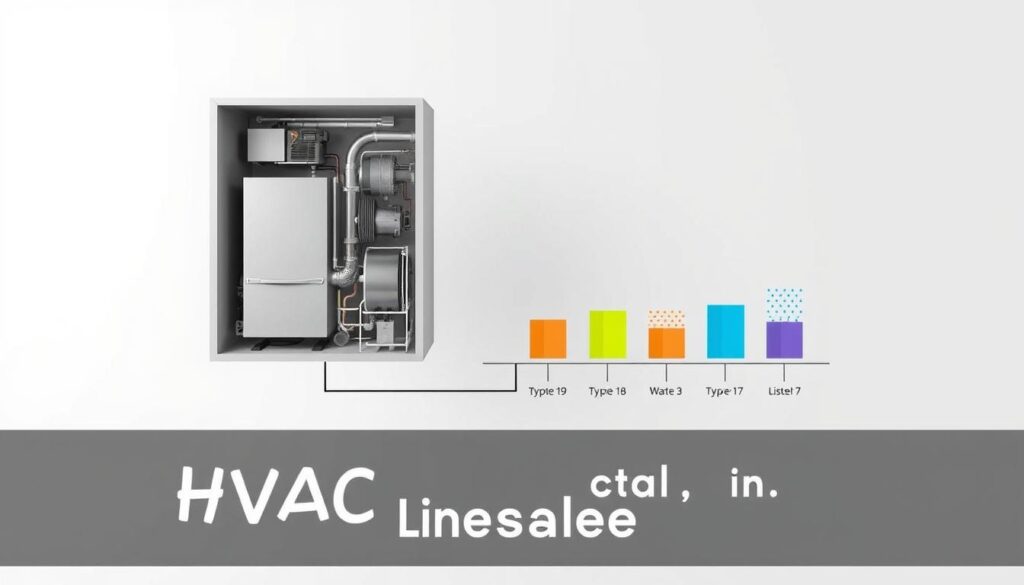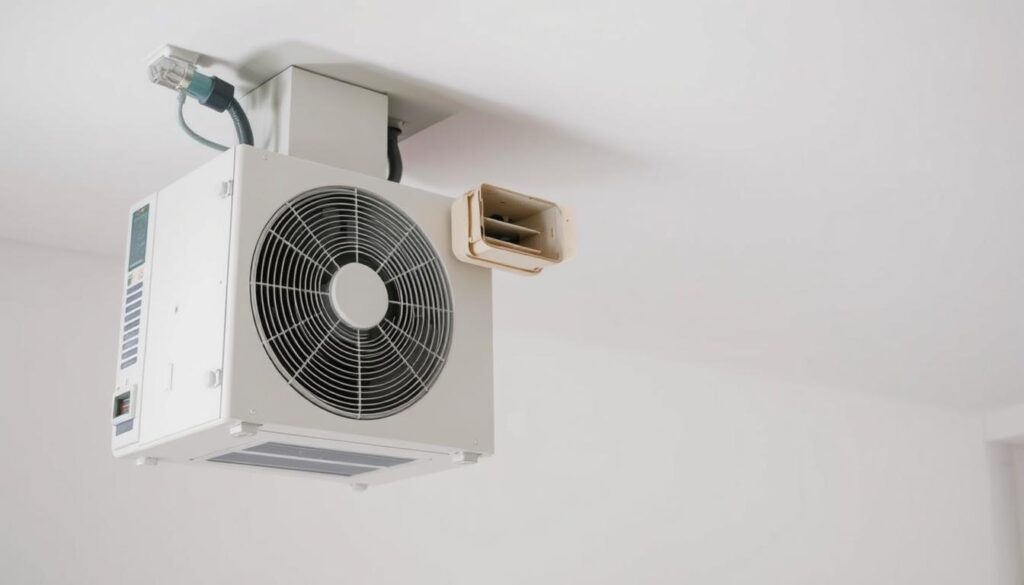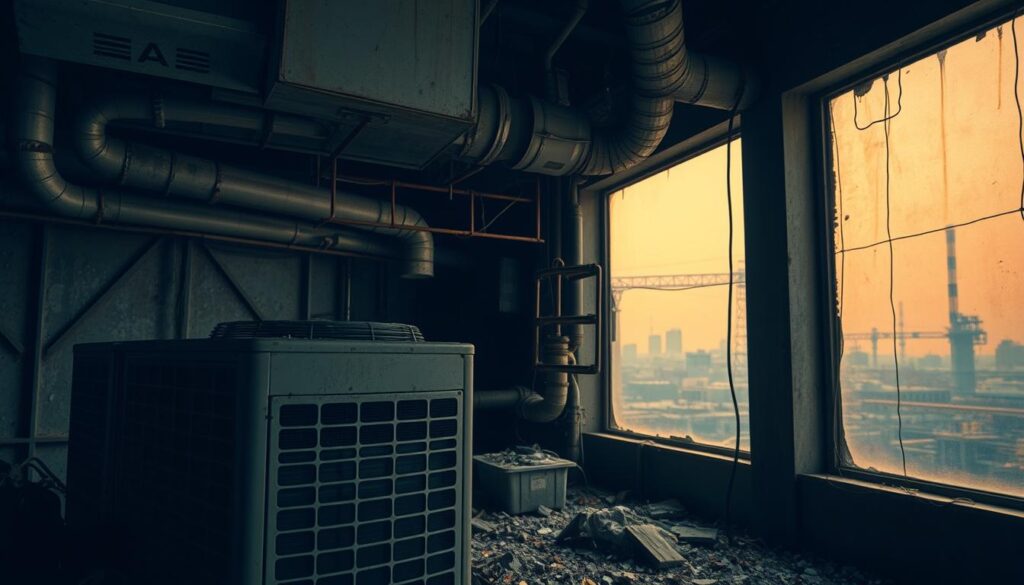Affiliate Disclosure
HVAC Guide Guys is a participant in the Amazon Services LLC Associates Program, an affiliate advertising program designed to provide a means for sites to earn advertising fees by advertising and linking to Amazon.
How Long Does HVAC Systems Last? Ever thought about how long your home’s HVAC system will last? Knowing how long it lasts can save you a lot of money on repairs and new systems.

Your HVAC system is key to your home’s comfort. Most systems last 15 to 20 years. But, how long yours lasts depends on a few things like how well you maintain it, how often you use it, and the environment around it.
Understanding how long HVAC systems last is more than just knowing when to replace them. It’s about making smart choices to keep your home comfortable and save money.
Key Takeaways
- Average HVAC system lifespan ranges from 15-20 years
- Regular maintenance significantly extends system longevity
- Different HVAC components have varying life expectancies
- Annual professional inspections are key for system health
- Signs of declining performance mean it might be time for a new system
Table of Contents
Understanding HVAC System Basics and Components
Your HVAC system keeps your home comfortable. It controls the temperature and air quality. Knowing how it works can help it last longer and work better.
HVAC systems have many parts. They work together to heat, cool, and ventilate your home. Their performance and lifespan depend on these parts working well together.
Different Types of HVAC Systems
Today’s homes often have different HVAC setups:
- Central Air Conditioning Systems
- Heat Pump Systems
- Ductless Mini-Split Systems
- Furnace and Air Conditioner Combinations
Key Components of Modern HVAC Systems
Every HVAC system has important parts:
- Compressor: Moves refrigerant and heat
- Condenser Coil: Takes in or gives out heat
- Evaporator Coil: Cools the air inside
- Blower Motor: Pushes air through ducts
- Thermostat: Sets the temperature and controls the system
The Role of Each Component in System Longevity
Knowing how these parts work together is key. Regular upkeep keeps them running smoothly. This boosts your system’s durability and prevents early breakdowns.
Proper care and regular checks by pros can make your HVAC last for years longer.
Explore Our HVAC Shop
Looking for top-rated HVAC tools, parts, and accessories? Visit our shop and find the perfect solution for your needs.
Visit the ShopHow Long Does HVAC Systems Last: Average Lifespans
Knowing when to replace your HVAC system is key for homeowners. The lifespan of HVAC systems varies based on several factors. These include how well you maintain it, how often you use it, and the environment it’s in.
Most HVAC systems last between 15 to 25 years. Here’s a quick look at what you can expect:
- Central Air Conditioning Units: 12-17 years
- Heat Pumps: 10-20 years
- Gas Furnaces: 20-30 years with proper care
- Oil Furnaces: 10-15 years
- Boilers: 20-35 years
To make your HVAC system last longer, you need to take good care of it. Important steps include:
- Regular professional inspections
- Consistent filter replacements
- Proper installation
- Managing system workload
Environmental conditions greatly affect how long your HVAC system lasts. Places near the coast or with extreme weather can shorten your system’s life. For example, coastal areas might see systems lasting only 7-12 years, compared to 15-20 years inland.
Knowing how long your HVAC system is expected to last helps you plan. It also guides you in choosing maintenance strategies that keep your system running smoothly.
Lifespan Expectations for Different HVAC Types
Knowing how long your HVAC system will last is key for homeowners. It helps with planning and budgeting. The lifespan varies based on how much you use it, how well you maintain it, and your local weather.
Homeowners need to understand the lifespan of each HVAC type. How long it lasts depends on regular upkeep, the quality of its installation, and your local climate.
Furnace Performance and Durability
Gas furnaces are a big investment for heating your home. With the right care, they can last 15 to 30 years. Several factors affect their lifespan, including:
- Quality of initial installation
- How often you get professional maintenance
- How you use it
- Your local climate
Air Conditioning Unit Expectations
Air conditioning units usually last 10 to 20 years. The region you live in greatly affects how long they last.
| Region | Average Lifespan | Potential Challenges |
|---|---|---|
| Midwest | 15-20 years | Moderate seasonal changes |
| Florida | 10-15 years | High humidity, salt exposure |
| California | 12-25 years | Varied climate conditions |
Heat Pump Longevity
Heat pumps provide both heating and cooling. They usually last 10 to 20 years. Coastal areas might see them last 7-12 years.
Regular maintenance can make your HVAC system last longer. It might even last longer than expected.
Factors Affecting HVAC System Durability
Knowing what affects hvac units durability is key to making them last longer. The life of your HVAC system depends on many factors. These factors can either help or harm its performance.
Several important factors affect your system’s durability:
- Installation Quality: A professional installation by certified technicians can greatly improve system longevity
- Maintenance Practices: Regular service helps prevent parts from wearing out
- Environmental Conditions: Extreme temperatures and humidity can stress HVAC parts
- System Sizing: The right size units avoid unnecessary strain
Important steps for keeping your HVAC units in top shape include:
- Make sure the system is the right size for your space
- Get professional annual inspections
- Replace air filters regularly
- Keep units safe from extreme weather
Your HVAC system can last from 10 to 25 years. How well you take care of it makes a big difference. Spending time and money on upkeep can make your system work better and last longer.
Proactive maintenance is always more cost-effective than reactive repairs.
Explore Our HVAC Shop
Looking for top-rated HVAC tools, parts, and accessories? Visit our shop and find the perfect solution for your needs.
Visit the ShopEssential Maintenance Tips to Extend HVAC Life
Keeping your HVAC system in good shape is key to making it last longer and work better. By following some smart maintenance tips, you can save a lot of money and keep your home cozy.
Regular upkeep is vital for a long-lasting HVAC system. Experts suggest several important steps to keep your system efficient:
Regular Service Schedules
Regular maintenance is the foundation of a durable HVAC system. Here are some key scheduling tips:
- Schedule professional tune-ups twice yearly – before summer and winter seasons
- Conduct annual thorough system inspections
- Regularly check electrical connections and parts
Filter Maintenance Guidelines
Air filters protect your HVAC system from dirt and debris. Follow these guidelines:
- Check filters every month
- Replace standard filters every 1-3 months
- Use high-quality filters that fit your system
Professional Inspection Requirements
While DIY maintenance is helpful, professional inspections are essential. Trained technicians can:
- Spot issues before they get big
- Check refrigerant levels
- Clean and adjust system parts
- Ensure your system runs at its best
Regular maintenance can make your HVAC system last up to 40% longer and cut energy costs a lot.
By following these maintenance tips, you’ll safeguard your investment and enjoy comfort for many years.
Signs Your HVAC System Needs Replacement

Knowing when your HVAC system needs a new one can prevent big problems and save money. Your system sends out signals that smart homeowners should catch. These signals can mean big trouble if ignored.
When you see these signs, it’s time to think about replacing your HVAC:
- Frequent and costly repairs that cost more than half of a new system
- Big jumps in your energy bills
- Temperatures in your home that don’t stay even
- Strange noises or smells coming from your system
Spotting the signs of an aging HVAC means watching how well it works. If your system is over 15 years old and keeps having problems, it’s likely time for a new one.
| Warning Sign | Potential Impact |
|---|---|
| Repairs more than twice a year | Shows your system is nearing the end |
| Energy bill spike of 20-30% | Means your system is losing a lot of efficiency |
| Humidity control problems | Can mess with your comfort and air quality |
Experts say it’s wise to consider replacing when repair costs get close to half of a new system’s price. Don’t wait for a complete system failure. Replacing it early can stop sudden breakdowns and save you money later.
An inefficient HVAC system costs more than just comfort. It can also raise your energy bills and harm your home’s air quality.
Explore Our HVAC Shop
Looking for top-rated HVAC tools, parts, and accessories? Visit our shop and find the perfect solution for your needs.
Visit the ShopCost Considerations: Repair vs. Replace
Choosing between repairing or replacing your HVAC system is tough. It affects your home’s comfort and your wallet. Knowing about hvac replacement costs and energy savings can guide your decision.
The HVAC world has a “$5,000 rule” to help homeowners decide. It’s simple:
- Multiply your HVAC’s age by the repair cost
- If it’s over $5,000, replace it
- If it’s under $5,000, fixing it might be better
The $5,000 Rule in Practice
Let’s say your 10-year-old system needs a $400 fix. That’s 10 × $400 = $4,000. In this case, fixing it is wise. But, a 15-year-old system needing a $500 fix would be $7,500, making replacement a better choice.
Energy Efficiency Benefits
Getting a new HVAC system brings big energy savings. Modern systems with high SEER ratings can cut energy use by over 35%. Plus, ENERGY STAR® certified systems might get tax credits and rebates, making them even more appealing.
- New systems have SEER ratings of 14-15
- Save up to 35% on energy costs
- Get tax credits and rebates
Remember, older systems using R-22 refrigerant are being phased out. This makes repairs pricey. A new system boosts comfort and saves money in the long run.
Environmental Impact on HVAC Longevity

Your HVAC system’s life span is greatly affected by its environment. Different conditions can either shorten or extend its life.
Coastal areas are tough on HVAC systems. Salt-laden air accelerates corrosion, cutting down the life of air conditioning units from 12-18 years to 7-12 years. The marine environment quickly damages metals and stresses electrical parts.
“Environmental conditions are silent architects of your HVAC system’s longevity.” – HVAC Engineering Insights
Several environmental factors affect your HVAC’s efficiency and life:
- Humidity levels affecting system performance
- Temperature extremes causing mechanical strain
- Air quality and particulate matter exposure
- Proximity to industrial or coastal zones
To protect your HVAC, you need to take action. Regular maintenance, protective covers, and professional checks can help. Here are some strategies:
- Install corrosion-resistant protective screens
- Schedule more frequent professional inspections
- Use high-quality air filters
- Implement annual deep cleaning protocols
By understanding and tackling environmental impacts, you can extend your HVAC’s life. This keeps it running at its best.
Explore Our HVAC Shop
Looking for top-rated HVAC tools, parts, and accessories? Visit our shop and find the perfect solution for your needs.
Visit the ShopModern HVAC Technology and System Upgrades
HVAC technology has changed a lot in recent years. It now offers homeowners ways to save on energy and cut down on costs. New smart technologies are changing how we control and improve our home comfort systems.
Today’s HVAC systems have advanced features that boost performance and cut energy use. These include:
- Smart thermostats with AI-powered learning
- Zoning systems for custom temperature control
- Advanced air filtration systems
- IoT-connected monitoring systems
Electric air-source heat pumps are a big step forward in energy-saving tech. They use 1/3 less energy than old HVAC systems. This makes them great for those who care about the environment.
| Technology Feature | Energy Savings |
|---|---|
| Smart Thermostats | 10-15% less energy costs |
| Zoning Systems | Up to 20% more energy efficiency |
| Heat Pump Technology | Up to 50% less heat energy use |
New laws have made it easier to get tax credits and rebates for HVAC upgrades. By using these new technologies, you can make your home more comfortable, lower your energy bills, and help the environment.
Conclusion
Knowing how long HVAC systems last is key for homeowners. It helps keep your home comfortable and efficient. Your heating and cooling systems usually last 15 to 20 years. But, with the right care, they can last even longer.
Following HVAC maintenance tips is your best way to avoid early system failure. This also helps avoid expensive replacements. Taking care of your system early on can make a big difference.
Regular maintenance is essential. Change filters every 1-3 months and get professional checks. This keeps your system running smoothly. Watch for signs like high bills, uneven temperatures, or strange noises. These can mean it’s time for repairs or a new system.
Focus on energy efficiency for long-term savings. Good systems and regular upkeep save money and prevent breakdowns. Each part of your system, like furnaces and air conditioners, has its own life span. Knowing this helps you plan and budget for your home’s comfort.
Your HVAC system is a big investment in your home’s comfort and value. Stay informed, maintain regularly, and address issues early. This way, you can get the most out of your system for years to come.

